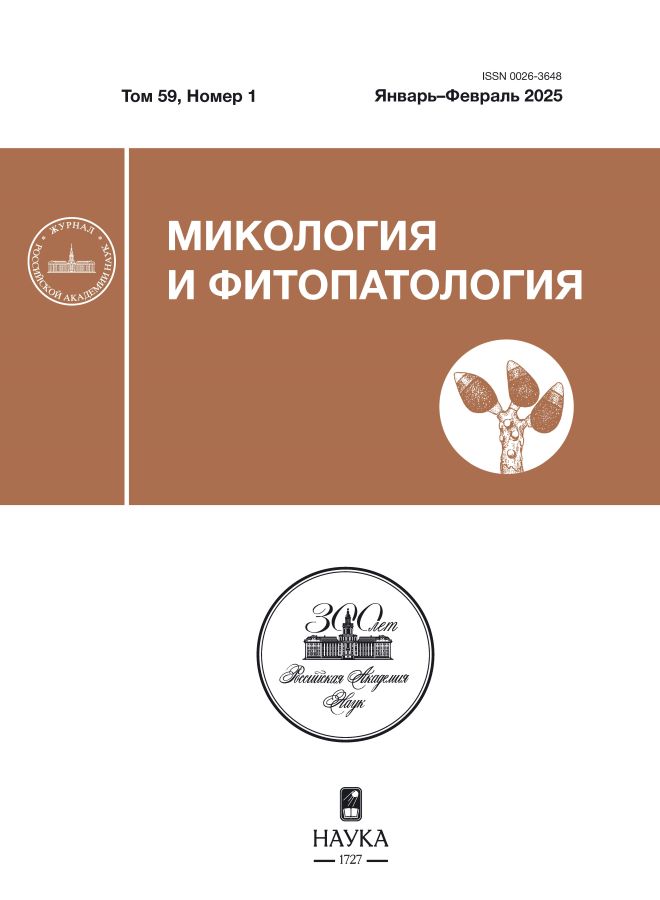LM and SEM study of the type specimen of Diacheopsis pieninica (Myxomycetes)
- Authors: Bortnikov F.M.1
-
Affiliations:
- Komarov Botanical Institute of the Russian Academy of Sciences
- Issue: Vol 59, No 1 (2025)
- Pages: 22-26
- Section: БИОРАЗНООБРАЗИЕ, СИСТЕМАТИКА, ЭКОЛОГИЯ
- URL: https://ruspoj.com/0026-3648/article/view/681161
- DOI: https://doi.org/10.31857/S0026364825010033
- EDN: https://elibrary.ru/ssdqnz
- ID: 681161
Cite item
Abstract
The previously presumed lost holotype of Diacheopsis pieninica is examined using light and scanning electron microscopy. A text description of this species from the original publication is given and supplemented with illustrations, more accurate measurements of spore diameter, and characteristics of capillitium, spores, and the peridium inner surface under SEM.
Keywords
Full Text
About the authors
F. M. Bortnikov
Komarov Botanical Institute of the Russian Academy of Sciences
Author for correspondence.
Email: f.m.bortnikov@gmail.com
Russian Federation, Saint Petersburg, 197376
References
- Hooff J.P.M. van, Nannenga-Bremekamp N.E. Additions to the Myxomycetes of the Netherlands. Proc. Koninkl. Nederl. Akad Wetenschapp. Sect. C. 1996. V. 99 (1–2). P. 45–53.
- Kowalski D.T. The Genus Diacheopsis. Mycologia. 1975. V. 67 (3). P. 616–628. https://doi.org/10.1080/00275514.1975.12019784
- Krzemieniewska H. Śluzowce Pienin [Myxomycetes of Pieniny]. Kosmos. Ser. A. 1948. V. 65 (1–4). P. 186–194.
- Krzemieniewska H. Śluzowce Polski na tle flory śluzowców europejskich [Polish slime molds against the background of European slime mold flora]. Warsaw, 1960.
- Lado C. 2005–2022. An on-line nomenclatural information system of Eumycetozoa. https://eumycetozoa.com. Accessed 25.06.2024.
- Martin G.W., Alexopoulos C J. The Myxomycetes. Iowa City, 1969.
- Moreno G., Castillo A., Thüs H. Critical revision of Stemonitis and Symphytocarpus (Myxomycetes) at the Natural History Museum London (BM). Phytotaxa. 2020. V. 458 (4). P. 257–280. https://doi.org/10.11646/phytotaxa.458.4.3
- Moreno G., Castillo A., Thüs H. Critical revision of Trichiales (Myxomycetes) at the Natural History Museum London (BM). Phytotaxa. 2022. V. 567 (1). P. 1–20. https://doi.org/10.11646/phytotaxa.567.1.1
- Singer H., Moreno G., Illana C. SEM studies of the type specimens of Lamproderma biasperosporum, Macbrideola argentea and Trichia cascadensis (Eumycetozoa, Myxomycetes). Sydowia. 2008. V. 61. P. 91–103.
- Stephenson S.L., Nannenga-Bremekamp N.E. Five new species of Myxomycetes from North America. Koninkl. Nederl. Akad Wetenschapp. Sect. C. 1990. V. 93. P. 187–196.
- Tasenkevich L., Mamchur Z., Khmil T. et al. Personal collections (XIX–XX centuries) in the herbarium of Ivan Franko National University of Lviv (LW). Visnyk of the Lviv University. Series Biology. 2014. V. 65. P. 112–120.
- Yan S.Z., Guo M.Q., Chen S.L. Two new species of Diacheopsis from China. Mycotaxon. 2014. V. 128 (1). P. 173–178. https://doi.org/10.5248/128.173
Supplementary files
Supplementary Files
Action
1.
JATS XML
2.
Fig. 1. Diacheopsis pieninica: a, b – box of the type collection; c, d – sporangia; e, f – spotted peridium; g, h – capillitium; i, j – spores. Scale bars: c, d – 500 µm; e – 100 µm; f, g – 50 µm; h – 20 µm; i – 10 µm; j – 1 µm.
Download (1MB)
3.
Fig. 2. Diacheopsis pieninica: a – capillitium and a piece of peridium in transmitted light; reprinted from Krzemieniewska (1960, Tab. 11, fig. 5); original size: 36 × 26 mm, b, c – inner side of peridium; c, d – capillitium and spores. Scale bars: b, d – 10 µm; c, e – 2 µm.
Download (866KB)












